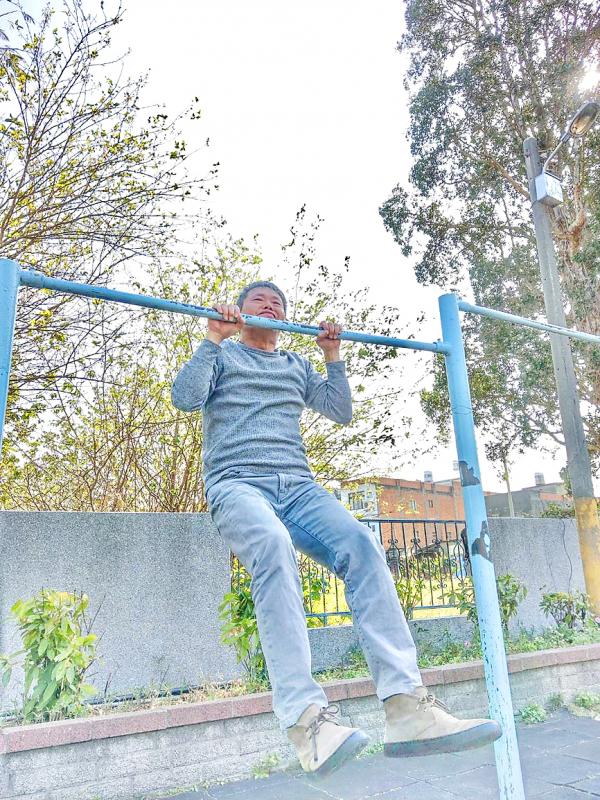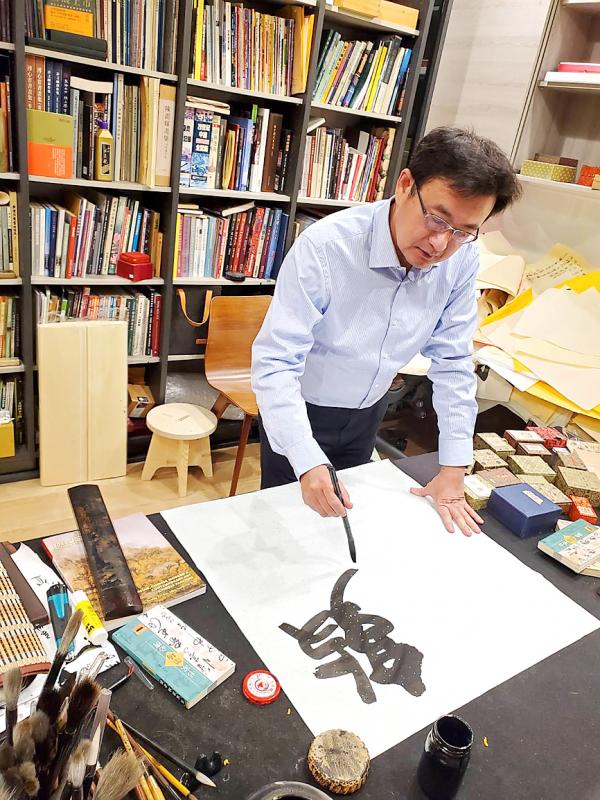Many legislators hide a special talent behind their serious public demeanor, whether it be a passion sparked in childhood or one of many skills explored before holding office.
Despite his wiry frame, Chinese Nationalist Party (KMT) Legislator Lin Wei-chou (林為洲) is stronger than he looks, and has the credentials to prove it.
Years ago, Lin was an arm-wrestling champion, winning fourth place in a national competition during college.

Photo: Chen Yun, Taipei Times
Now 59 years old, the KMT heavyweight said he discovered his extraordinary strength at an early age.
When growing up he could always beat his opponents, even though he was neither tall nor particularly brawny, he said, adding that no one could overtake him throughout grade school and he eventually became the top competitor in Hsinchu County.
While he was in college, a beer importer organized an arm-wrestling competition to promote its entrance into the Taiwanese market.

Photo courtesy of Huang Kuo-shu’s office
Regardless of his lack of training or conditioning, Lin said he entered to test his mettle against nearly 100 other competitors.
The young Chinese-language major faced off against bodybuilders and personal trainers, overcoming most of them to win fourth place, along with a crate of beer and a few thousand New Taiwan dollars.
When not in the legislature, KMT Legislator Wu I-ding (吳怡玎) likes to spend her time in the kitchen preparing exquisite meals with knowledge obtained in part from the French culinary school Le Cordon Bleu.
Her love of cooking began in her fourth year of college while she was on exchange in Vancouver, where she learned from the spouses of doctoral candidates living in her dorm, Wu said.
She left her first job in private equity during the financial crisis in 2008, and took the opportunity to apply to Le Cordon Bleu in London.
After three months of study, Wu passed the basic cuisine certification exam with a nearly perfect score, only losing points for forgetting to remove the toothpicks from her fish roll.
She then returned to the world of finance, and after a decade moved to Shanghai, where she had originally envisioned opening a dumpling restaurant.
With all of the preparations completed and poised to sign for a storefront, Wu’s plans were sidetracked by licensing difficulties and her newly discovered pregnancy.
She returned to Taiwan in 2018 to give birth and only then stumbled into politics.
“I still have not forgotten that dumpling dream,” she said. “Maybe one day I will open a restaurant.”
For Democratic Progressive Party (DPP) Legislator Huang Kuo-shu (黃國書), calligraphy has been a lifelong passion starting from elementary school.
Aside from the calligraphy covering the walls of his office, Huang is next month to become the first legislator to stage a solo exhibition in the Legislative Yuan art gallery, while in October, the National Sun Yat-sen Memorial Hall in Taipei is to display 100 of his works.
Among the pieces to be displayed next month are the lyrics of the song Happiness for the World (樂為世界人), which democracy pioneer Chiang Wei-shui (蔣渭水) wrote for the Taiwanese Cultural Association.
The piece is meant to emphasize Taiwan’s determination to participate in global movements and connect with the world, Huang said.

POSITIVE DEVELOPMENT: Japan and the US are expected to hold in-depth discussions on Taiwan-related issues during the meeting next month, Japanese sources said The holding of a Japan-US leaders’ meeting ahead of US President Donald Trump’s visit to China is positive news for Taiwan, former Japan-Taiwan Exchange Association representative Hiroyasu Izumi said yesterday. After the Liberal Democratic Party’s landslide victory in Japan’s House of Representatives election, Japanese Prime Minister Sanae Takaichi is scheduled to visit the US next month, where she is to meet with Trump ahead of the US president’s planned visit to China from March 31 to April 2 for a meeting with Chinese President Xi Jinping (習近平). Japan and the US are expected to hold in-depth discussions on Taiwan-related issues during the

‘LIKE-MINDED PARTNER’: Tako van Popta said it would be inappropriate to delay signing the deal with Taiwan because of China, adding he would promote the issue Canadian senators have stressed Taiwan’s importance for international trade and expressed enthusiasm for ensuring the Taiwan-Canada trade cooperation framework agreement is implemented this year. Representative to Canada Harry Tseng (曾厚仁) in an interview with the Central News Agency (CNA) said he was increasingly uneasy about Ottawa’s delays in signing the agreement, especially as Ottawa has warmed toward Beijing. There are “no negotiations left. Not only [is it] initialed, we have three versions of the text ready: English, French and Mandarin,” Tseng said. “That tells you how close we are to the final signature.” Tseng said that he hoped Canadian Prime Minister Mark Carney

President William Lai (賴清德) yesterday bestowed one of Taiwan’s highest honors on Saint Vincent and the Grenadines (SVG) Ambassador Andrea Clare Bowman in recognition of her contributions to bilateral ties. “By conferring the Order of Brilliant Star with Grand Cordon on Ambassador Bowman today, I want to sincerely thank her, on behalf of the Taiwanese people, for her outstanding contribution to deepening diplomatic ties between Taiwan and SVG,” Lai said at a ceremony held at the Presidential Office in Taipei. He noted that Bowman became SVG’s first ambassador to Taiwan in 2019 and

A man walks past elementary school artworks at the Taipei Lantern Festival in Ximen District yesterday, the first day of the event. The festival is to run from 5pm to 10pm through March 15.